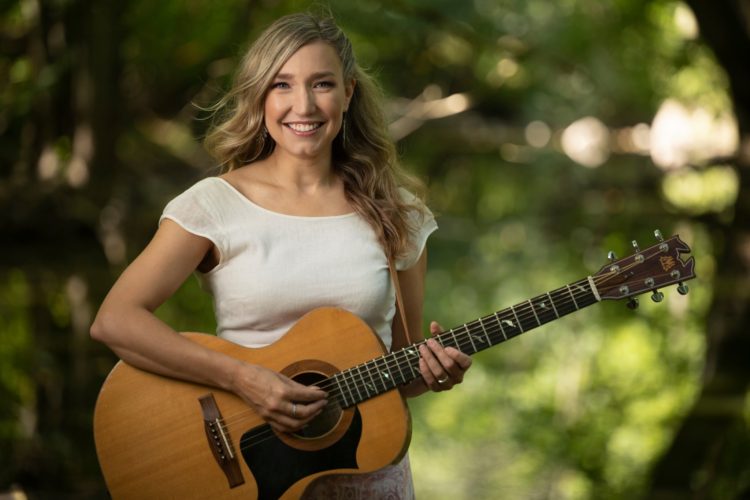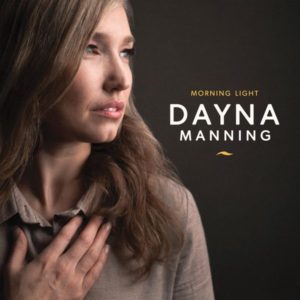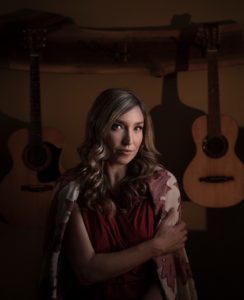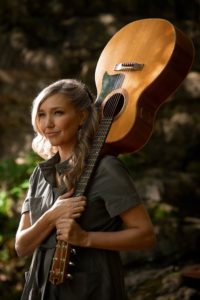
As successful and admired as singer/songwriter/producer Dayna Manning has been over her quarter century career navigating through the sometimes harsh and unforgiving waters of the music business, there is a sense that by far and away the best is yet to come.
Evidence for this prediction comes in the form of her latest album, the beautifully-executed and exquisite 12-song masterwork entitled Morning Light. It sees the talented Stratford, Ontario artist truly hitting her stride as a vocalist, songwriter, arranger, collaborator, and musical visionary. Morning Light is a stroke of creative genius where listeners can just tell by the exceptionality of the performances and production that Manning has begun to tap into a hitherto unexplored depth of her skills and inspiration.
Best known for her days as a precocious but eminently talented teen signed at the age of 15 to a major label record deal which spawned her first album, Volume 1, 22 years ago, and later as one-third of the critically lauded Canadiana trio Trent Severn from 2012 to 2018, Morning Light marks Manning’s foray into the Chamber Folk genre – a style of music that she has always loved, but only now felt emboldened to enter.
And, to be the master of the obvious, she has announced her presence in this new endeavour with grace and authority, as she has reworked a number of her originals, as well as adding in some new originals, previously unreleased originals and covers, for a dynamic musical adventure for the listener.
“I was invited to do a show with a group called Innerchamber in Stratford during Canada’s sesquicentennial year [2017] because they wanted to do folk songs from around Canada but using their instrumentation. I had already launched my pledge campaign for this record, but had a different plan for it, but when I got together with them for the first rehearsal and heard what they could do, I just did a 180 change in direction,” Manning said from her home in Stratford.
“I really loved the arranger, Ben Bolt-Martin who was working on that project, so I got him to do all the arrangements for Morning Light. I loved the French horn and loved how he used it in the traditional sense, where French horn was used for calls a lot of the time. He uses it that way on my record too. And I love the flute sound of this particular flute player Laura Chambers. I thought she was incredible. Innerchamber was the brainchild of Andrew Chung, who is the violinist on the album and the reason that it felt like home for me was that, number one, I grew up with Andrew. I wanted to play with him my whole life, and I really looked up to him. And secondly, my parents both play classical instruments, clarinet and trumpet, so it feels like something that has been around me my whole life. It just felt like home in more ways that one doing this album. Ultimately, I just wanted to make a folk album in Stratford, in 2019. I love having a time and place context to everything I do.”
 There are three wonderfully arranged and performed traditional tunes, including The Weaver, The Bonnie Banks of the Virgie O and Peter Amberley, as well as two reimagined Trent Severn songs, O Snow and King of the Background. The wistful Charlie Lake is an older composition, but one that is only seeing the light of day on Morning Light. Lead-off track The Same Way, You You You, I Get Closer and When I Love You were penned at some point over the last couple of years. To cap it off, Manning and the accompanying ensemble deftly cover the Joni Mitchell chestnut, Free Man in Paris. The last song on the album is an instrumental called Reflections, that features both her parents.
There are three wonderfully arranged and performed traditional tunes, including The Weaver, The Bonnie Banks of the Virgie O and Peter Amberley, as well as two reimagined Trent Severn songs, O Snow and King of the Background. The wistful Charlie Lake is an older composition, but one that is only seeing the light of day on Morning Light. Lead-off track The Same Way, You You You, I Get Closer and When I Love You were penned at some point over the last couple of years. To cap it off, Manning and the accompanying ensemble deftly cover the Joni Mitchell chestnut, Free Man in Paris. The last song on the album is an instrumental called Reflections, that features both her parents.
“I had 15 or 16 songs picked out for this project and these are the ones I felt worked out the way I wanted them to and I thought they went together well. And I also took my time in sequencing the record. I put the traditional songs together, and kind of wanted a reflective ending, and there was a bit of a more classical arc to the sequencing than on my other records. I am going to continue in this genre. I just loved working with Ben and we’re working on a bunch of different stuff for some shows,” she said, adding that the choice of traditional folk tunes came through research and tips from other musicians.
“Ian Bell, who is a very famous folk artist in Ontario, runs the Ontario Traditional Music Library online and is a music archivist. He helped me pick some songs. He helped me pick The Weaver, which is a really strange tune, that is kind of a sexual song that was kind of repressed and not sang in the presence of women. He came to one of my shows and said, ‘congratulations, you’re a folk singer.’ I just felt that my voice needed to sing these songs and I intend to continue to research them and bring them back to life. And I loved mixing them with new songs, it’s just so much fun.”
So, what is Chamber Folk, the genre to which Manning seems to have been born to espouse and inhabit, judging by the excellence of each and every composition and vocal performance on Morning Light.
“It’s kind of an underground genre that started in the 1960s and 1970s. The way I see it, folk music is the music of the people in the genre that I am normally associated with. In popular music, folk would be the genre of the people. In classical music, chamber music is the genre of the people because it was performed in living rooms, often by amateurs or professionals, because they loved the music. And that’s how the music is performed to this day, by amateurs as well as professionals because they just love the music,” she explained.
“It just felt, to me, like it was the most beautiful marriage of two genres. I certainly didn’t invent it or perfect it; there are actually websites out there dedicated to logging everyone who makes chamber folk, but it is still considered to be very, very underground, sub-genre stuff. And there is no set type of instrumentation. It could be a string quartet with a banjo. I would say though that’s its primarily stringed instruments. There can be chamber folk with piano, but I feel it sounds less like chamber folk. It really just has to be a small ensemble. It was the original house concert.
“To me its whimsical and the whimsy in the storytelling that it brought to my songs was incredible, especially the way it did songs like O Snow or Charlie Lake. And there is another song called I Get Closer, which is literally life lessons told through the perspective of my cat. And Ben made it so playful by making the flute into the bird in the story, and the marimba is the fish in the story and the violin is the mouse – the detail that was brought in by him was incredible. I doubt that you can ever bring that kind of detail in a normal rock band.”
At the same time as Morning Rain enlivened the music loving public, Manning also published her first book, Many Moons: A Songwriter’s Memoir. It looks at Manning’s remarkable life through the lens of a number of her most significant songs, from her early days as a teenaged sensation signed to a major label through her folk renaissance, her time with Trent Severn and beyond. It is written in a delightfully conversational style, and one can almost hear Manning’s charming, ebullient, lilting, voice on each and every page.

“I had the idea to write a different book and met with a local publisher here in Stratford [Heidi Sander of Blue Moon Publishers]. She had come to a number of my shows and over lunch we hatched this idea because she always hears my elaborate storytelling in between each song, and she suggested the book be stories about my songs. I although thought that the Morning Light album was a new springboard for me: I am in a new spot in my life and I thought it would be fun to document everything up until now. I actually feel that I am just getting started now and the rest of it was like going to school or university,” she said.
“And the other thing is I mentor a lot of young women in my community with songwriting and playing guitar and singing and I just want them to know that the goal is not necessarily to win American Idol, which is what they all want. The way they are consuming and being exposed to music right now is not the most healthy thing. So, I just wanted, through my own stories, to give them different reasons to write music, and show them that it opens doors and can take them on adventures.
“I don’t consider the book to be a work of literature. It’s a really fun story to tell, and people often say, ‘oh my gosh, what an adventure you’ve had. Who would have thought these things could happen.’ That’s the kind of reaction I am getting to the book. And it’s a pretty quick read, you can do it in under two hours or so. I think the people who have followed my whole career are the ones who are going to get the most out of it. It’s a snapshot into the Canadian music scene and what it’s like to be a Canadian songwriter for the past 25 years.”
As busy as she is with her various endeavours, Manning has dedicated a portion of her time and talent and energy to working with young musicians and artists in her home community of Stratford. She has created the Folk Army, a group of young girls and young women, who learn together how to play, writer and perform music.
“It seriously is a passion of mine. It’s a group of young women in my community who play guitar and sing, and we do all kinds of events together. They just sang the Log Driver’s Waltz at the Stratford Festival for a fundraiser, and they also will be opening my upcoming chamber folk shows. They are all really excellent and I am really proud of them,” she said.
“Building community music has been a priority for me because I felt alienated from my community musically because of having a record deal at such a young age. It kind of separated me a little bit. And there’s an opportunity now to get involved in your community and do more and make that the focus. Also, I feel that in a generation, things like going to church every Sunday morning has been lost. I am not religious, but there is an element of community and music there that I think is missing. And I hope to do things like Folk Army to help bring those elements back.
“I never intended the Folk Army to be just a girl thing. It’s just what happened because they come to my shows, and I understand where their voices need to be and I understand how big or small their hands are on a guitar, so I guess I am a specialist in that way. It’s really fun, and it’s really more about confidence too that it even is about music sometimes. I really love it. I even play trumpet in a band called New Horizons which is for adults who want to learn new instruments. So, I am really involved in my community right now and loving every minute of it.”
Manning has a solo acoustic show in Montreal on Nov. 9, before an official album release show in Toronto at Hugh’s Room on Nov. 15, where she will be performing alongside a chamber orchestra. A similar configuration and show will take place Dec. 15 at The Grand Theatre in London, Ontario. After that, Manning said tour dates will be coming later in 2020.

“I just got Factor funding to do a video for every song on the album, which is going to be amazing. So, over the next year I will be doing that, and my sights are set on booking a tour for next winter. These things take time. I find when you put a record out around now, it’s a two-year cycle and I see the shows coming about a year from the release. And also, the album has only been released in Canada. It hasn’t been released in the States or the U.K. yet, so that is something else I will be working on,” she said.
“After these couple of shows, my partner Keelan Purchase and I are going to do a special show with the Inner Chamber group in February called Love, where we sing these ridiculous love songs together and tell stories of love and I am really looking forward to that. It’s just a one off show, and I love doing those from time to time. I am also going to do a show at the Stratford Festival next season, and I will also be looking at doing another album.
“My hope is that this album is a launching point. I just would like to be able to play around the world with this music, and just speak of this different musical language to the traditional songs. The beautiful thing about this project is I don’t have to have the exact same chamber orchestra at every show. When people are not available, I can hire another musician because everything is written out and we can just do our thing. So, if I was playing in England, I can hire a French horn player or violinist over there. Another great thing about doing this music is that I never really knew the range of my voice before. I know exactly what my range is now and where I can sing, which notes I can use. I used to kind of leave that all to chance, but no I am more educated. Listen, I am a 40-year-old woman and the record that most people know me for, my first one, I literally wrote when I was 15 years old and put out at 16. It’s a whole new ballgame for me now.”
For more information on tour dates, Morning Light, Many Moons and other activities, visit www.daynamanning.com.
- Jim Barber is a veteran award-winning journalist and author based in Napanee, ON, who has been writing about music and musicians for nearly three decades. Besides his journalistic endeavours, he now works as a communications and marketing specialist. Contact him at jimbarberwritingservices@gmail.com.
SHARE THIS POST:
